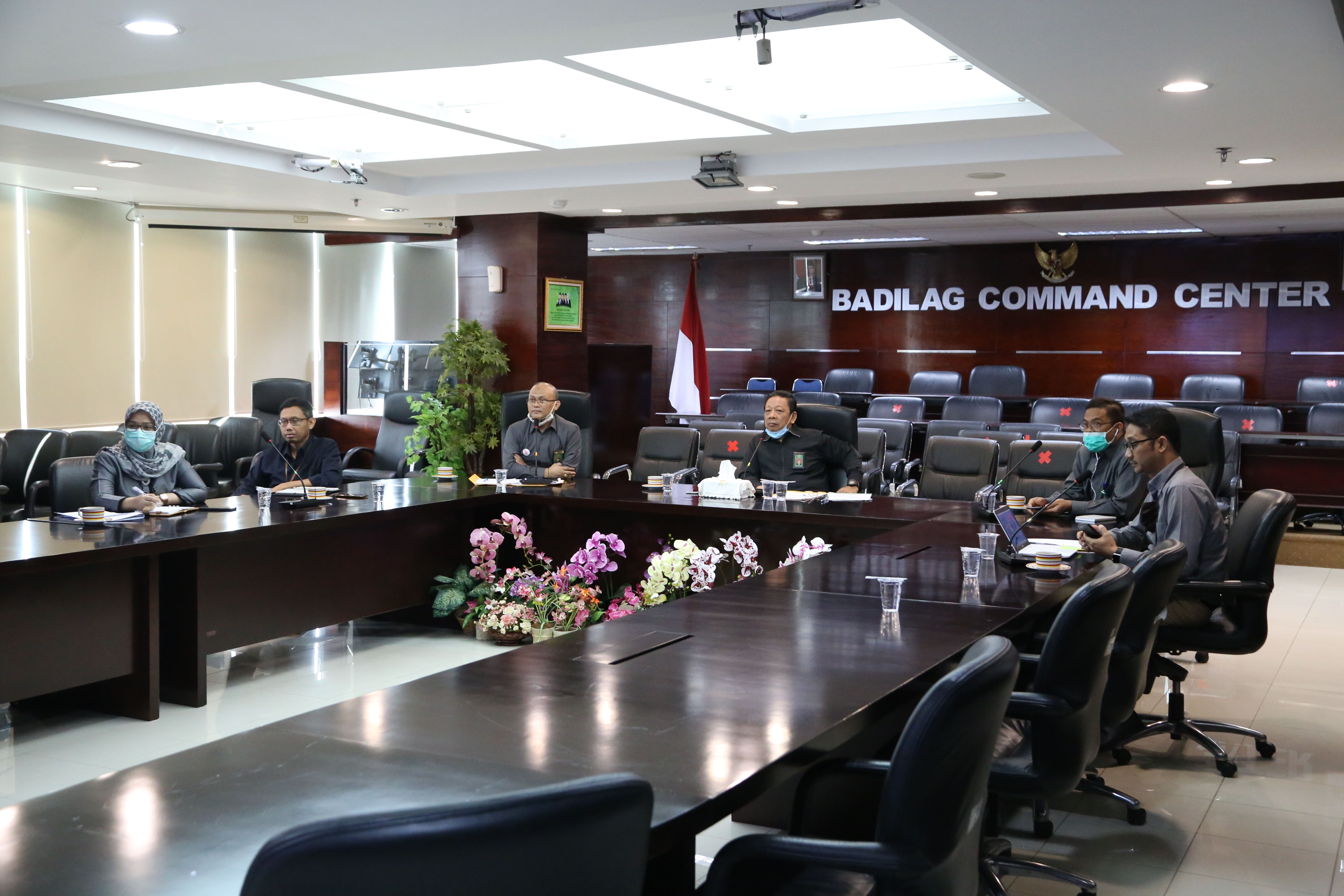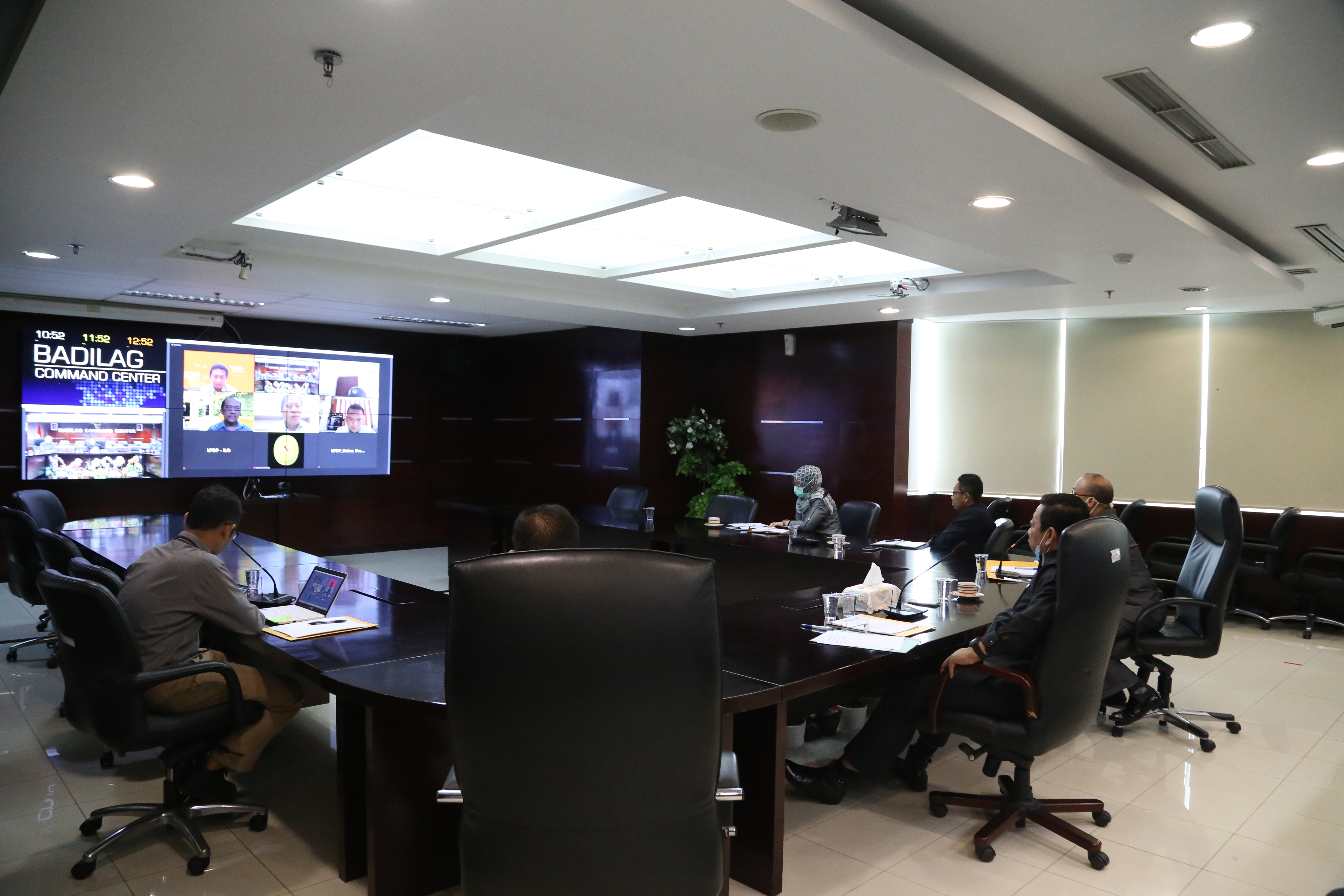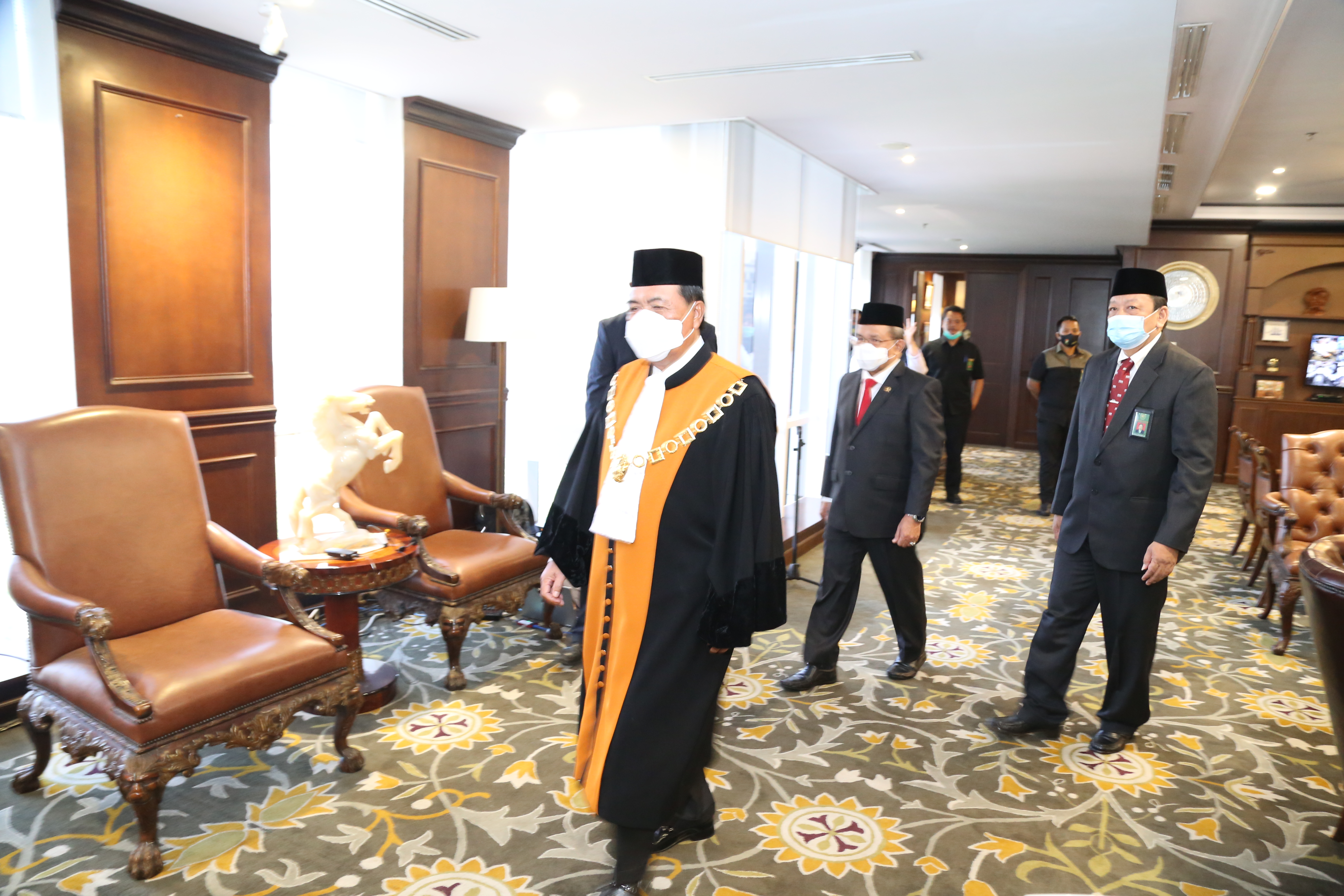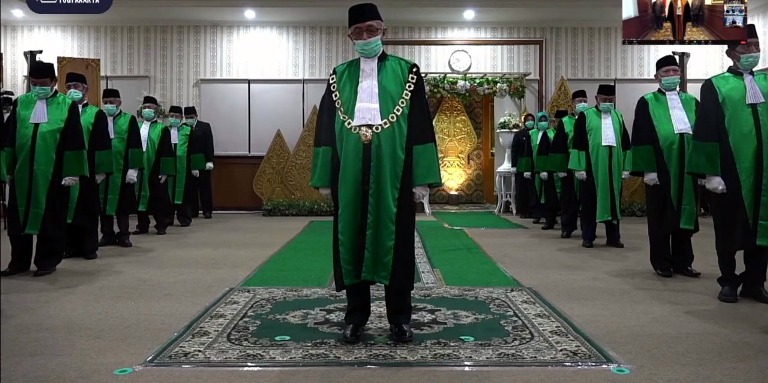Vice President of the Republic of Indonesia: Religious Court Is an Important Part of
the Sharia Economic Ecosystem
(National Sharia Economics Webinar)
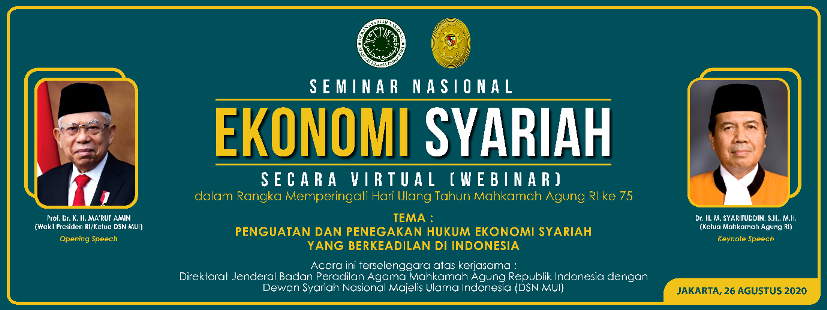
Presenting the National Leader
Wednesday, 26 August 2020, MARI's Directorate General of Religious Courts (Badilag) in collaboration with the National Sharia Council of the Indonesian Ulama Council held a virtual national seminar with the theme Strengthening & Enforcement of Sharia Economic Law Justice in Indonesia.
This seminar presented some speakers, which are the Vice President of the Republic of Indonesia/Chair of the National Sharia Council, Prof. Dr. KH. Ma'ruf Amin, Chief Justice of the Supreme Court of the Republic of Indonesia, Dr. H. M. Syarifuddin, S.H., M.H., Chief Justice of the 2012-2020 Supreme Court, Prof. Dr. H.M. Hatta Ali, S.H., M.H., Chairman of the Religious Chamber of the Supreme Court of the Republic of Indonesia, Dr. Amran Suadi, S.H., M.M., M.Hum., Director General of the Religious Courts of the Supreme Court of the Republic of Indonesia, Dr. Drs. H. Aco Nur, S.H., M.H., Deputy Chairman of the National Sharia Council, Prof. Dr. Jaih Mubarok, S.E., S.H., M.Ag. and from the Financial Services Authority, Dr. Setiawan Budi Utomo.
As the opening speaker, the Vice President of the Republic of Indonesia conveyed several important things related to the development of the sharia economy in Indonesia. Indonesia has become the country with the largest number of Islamic financial institutions in the world, with more than 5,000 institutions, consisting of 34 Sharia Banks, 58 Sharia Insurances, 7 Sharia Venture Capital, 163 Sharia People's Financing Banks (BPRS), 4,500 to 5,500 Sharia Cooperatives / Baitul Maal wat Tamwil, and there are also 4 sharia pawnshops.
The total assets as of April 2020 were IDR 1,496.05 trillion. This amount does not include Islamic stocks, the details are the Islamic capital market (sukuk and mutual funds) of IDR 851.72 trillion, Islamic banking IDR 544.86 trillion, and IDR 109.47 trillion of Islamic non-bank financial industry (IKNB). Indonesia also has the largest retail customers in the single market with a total of more than 23 million accounts, issued retail sukuk, and created the world's first Shariah Online Trading System.
In addition, the Vice President also emphasized the importance of the role of the Supreme Court, especially the religious courts in supporting the syariah economic legal system in Indonesia, "I appreciate the holding of this National Seminar, because it raises a strategic theme, Strengthening and Enforcement of Sharia Economic Law in Indonesia. Law enforcement is one of the pillars of Islamic economic implementation that has not received adequate attention.
Even though its existence is an important part of the Islamic economic ecosystem. Therefore, holding this seminar can be momentum for reforming and enhancing aspects of sharia economic law in Indonesia," he said. Closing the speech as well as opening this national seminar, the Vice President of the Republic of Indonesia expressed his appreciation for the Directorate General of Badilag and DSN MUI for holding a national seminar that is very relevant to current socio-economic developments.
The Chief Justice of the Republic of Indonesia as the main speaker, conveyed several important things related to Supreme Court policies in supporting the government's efforts to create a climate of ease of doing business, including in the field of sharia economics. Throughout 2019, the Supreme Court through its Working Group has carried out various reforms related to ease of doing business, including, First, refinement of the legal framework for electronic courts through Perma/Supreme Court Regulation Number 1 of 2019 concerning Administration of Cases and Trials in Courts Electronically replacing Perma Number 3 of 2018, Second, Ratification of Perma Number 4 of 2019 concerning Small Claim Court Procedure. Third, Training that supports the Ease of Doing Business.
In order to simplify and facilitate the process of doing business and investing. He also conveyed the impact of the policy of the Supreme Court in his speech, "Religious court judges also have an important role in encouraging the ease of doing business in the sharia economic sector. Evidently, from the 308 sharia economic cases handled by first instance court judges in 2019, 168 cases, or 54.54% were filed in the form of Small Claim Court Procedure.
This figure shows that the mechanism established as a friendly for business people has been welcomed in the field of Islamic economics. And what is even more proud, from the 168 cases of small claim court, 91.38% of them can be resolved in less than 25 days."
In his remarks, the Director-General of Badilag as chairman of the organizing committee said that this seminar activity was held in collaboration with the Supreme Court of the Republic of Indonesia-Directorate General of the Religious Courts with the National Sharia Council of the Indonesian Ulema Council, with the aim of:
- 1. Increasing the capacity of religious court judges in adjudicating sharia economic disputes;
- 2. Equalizing perceptions on the application of sharia economic law;
- 3. Increasing the knowledge and insight of stakeholders in the implementation of sharia economy in Indonesia;
- 4. Strengthening public confidence in religious courts in resolving sharia economic disputes; and
- 5. Disseminating sharia economy and the prospects for implementing sharia bankruptcy law in Indonesia.
This national seminar drew attention and interest from the public. Besides being attended by 412 religious courts and 29 high religious courts, sharia banking, practitioners of sharia law and economics, faculties of sharia and law at UIN / IAIN throughout Indonesia, participants who took part in this seminar were 1701 people, either through Zoom, or who watched via YouTube live streaming.
Strengthening and Enforcement of Sharia Economic Law
The growth and development of the sharia economic system in Indonesia is so fast because it is politically supported by the government and by various components of the economic community in Indonesia. With this perspective, Indonesia is expected to become the "Qibla of the World Sharia Economy", as stipulated in the master plan and grand design of Islamic economics in Indonesia. To realize these ideals, it is deemed necessary to strengthen the Islamic economic system in various aspects, including the settlement of disputes.
The Religious Courts under the Supreme Court are the executors of judicial power that are authorized by laws and regulations in Indonesia to resolve sharia economic disputes by litigation. For this reason, it is necessary to increase the capacity and professionalism of judges in examining and adjudicating sharia economic cases, to provide decisions that fulfill a sense of justice, certainty, and benefit so that the level of trust of the sharia business community in the judiciary is higher, so that the climate of ease of doing business in the field of sharia economy in Indonesia is more open, which in turn can support the acceleration of national economic growth.
Judges in adjudicating sharia economic cases, of course, cannot be separated from the sources of laws and regulations that apply in the field of sharia economics. For this reason, judges need to understand more comprehensively about the history, dynamics, and the ins and outs of discussion and debate among experts accompanying the birth of each fatwa of the National Sharia Council (DSN) of the Indonesian Ulama Council (MUI).
In-depth understanding is a necessity for judges to be easier, more precise, and correct in implementing it when examining and adjudicating sharia economic cases submitted to religious courts. The DSN MUI fatwas are a source of law for the birth of government regulations in the field of sharia economics, including the Financial Services Authority (OJK) Regulation, Bank Indonesia Regulation, Minister of Finance Regulation, and others. Until now, there have been 130 (one hundred and thirty) fatwas issued by DSN with various variations of the contracts that it regulates.
In addition, the MUI DSN also needs to get feedback (feedback) from every DSN Fatwa that has been published in order to determine the effectiveness of its implementation in concrete cases that occur in the community, and the resolution is proposed to the religious court.
The settlement of sharia economic disputes through litigation in religious courts is still hampered by the procedural law aspects, especially the legal aspects of sharia bankruptcy. Supreme Court Regulation Number 14 of 2016 concerning Procedures for Settlement of Sharia Economic Cases does not yet regulate sharia bankruptcy. Whereas in reality, several sharia economic disputes submitted to the religious court are closely related to the issue of bankruptcy and sharia commerce, which have not clearly been regulated in the procedures and the procedural law. There needs to be a Working Group (Pokja) on sharia bankruptcy to become material for the National Working Meeting (Rakernas) for sharia economic bankruptcy. Based on this, it is very important to increase the capacity and capability of the religious courts in resolving sharia bankruptcy cases in sharia commercial cases.
Indonesia's position in the Global Competitiveness Index published by the World Economic Forum (WEF), especially the aspect of ease of doing business, is still very low compared to other countries. One aspect that is still under the spotlight is the level of legal certainty in dispute resolution and execution of decisions that require a quite expensive and long time, cost, and labor. In reality, the execution of sharia economic decisions is often hampered by the lack of support from various related institutions, and other technical problems that all components of the nation need to find solutions to, including the executive, legislative, and judiciary, so that the objectives of the Indonesian rule of law can be realized. (ahb/ak)



